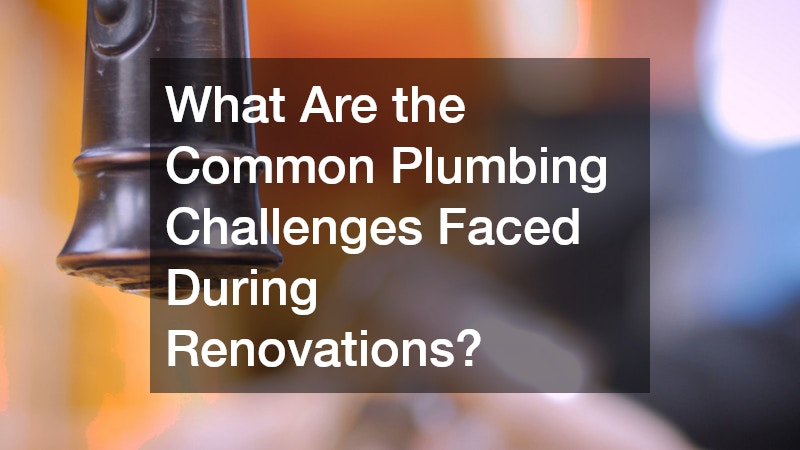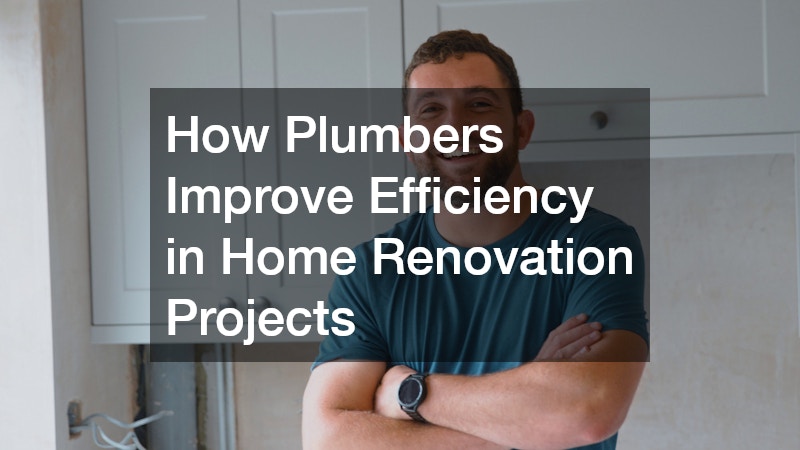Home renovation projects often involve a complex web of tasks, from updating fixtures to reconfiguring layouts, all while maintaining functionality and safety. One crucial component that can significantly influence the outcome is the work performed by professional plumbers. Proper plumbing ensures not only the smooth operation of water supply and drainage but also the long-term reliability of the home’s infrastructure. Plumbers bring expertise, specialized tools, and knowledge of local codes and best practices, which can make the difference between a seamless renovation and costly setbacks.
In addition to installing or repairing pipes and fixtures, plumbers collaborate with other contractors, anticipate potential issues, and implement solutions that save time and resources. Homeowners who attempt to tackle plumbing themselves often underestimate the complexity of the systems involved, leading to water damage, leaks, or expensive repairs down the line. This article explores the many ways plumbers contribute to efficiency in home renovation projects. We’ll cover home renovations contractor assessments, updates, coordination with other trades, preventive strategies, and eco-friendly solutions, helping homeowners understand the value of hiring skilled professionals. Whether you’re considering minor kitchen updates or a full-scale remodel, working with a plumber ensures that your project proceeds efficiently, safely, and with minimal surprises.
Why Is It Important to Hire a Professional Plumber for a Renovation?

Understanding the Complexities of Plumbing Systems
Modern plumbing systems are more intricate than they might appear at first glance. They involve a network of pipes, valves, fixtures, and appliances that all work together to provide safe, clean water and efficiently remove wastewater. For renovations, these systems may need to be relocated, upgraded, or expanded, requiring careful planning to prevent leaks or pressure issues. Plumbers are trained to read blueprints, understand water flow dynamics, and identify potential problem areas that could interfere with a renovation’s success.
A local plumber has additional value because they understand regional building codes, water quality issues, and climate-related considerations that affect plumbing longevity. By consulting with professional plumbers before or during renovations, homeowners can ensure their investments are protected, plumbing components are properly sized, and future issues are minimized. Plumbers also consider factors such as water purification, water softener installation, and the compatibility of fixtures with existing infrastructure, all of which are crucial for a smooth renovation process.
The Risks of DIY Plumbing Work
Many homeowners are tempted to perform plumbing tasks themselves, hoping to save money. However, DIY plumbing carries significant risks, particularly during a renovation. Mistakes in pipe connections, incorrect fixture installation, or failure to follow code requirements can lead to leaks, water damage, and even mold growth, necessitating costly water damage remediation. Additionally, improperly installed plumbing can reduce water efficiency, increase utility bills, and compromise the overall value of the renovation.
Hiring professional plumbers mitigates these risks. Local plumbers bring experience with common renovation challenges, such as reconfiguring bathrooms, kitchens, or laundry areas. Drain cleaning plumbers can address clogs or obstructions that would otherwise delay the project. By relying on trained experts, homeowners reduce the likelihood of errors and ensure that the plumbing system will function reliably for years to come, allowing the renovation to progress smoothly.
How Do Plumbers Assess Plumbing Needs During a Renovation?
Conducting Thorough Inspections
Before any renovation work begins, professional plumbers conduct detailed inspections of the existing plumbing system. This involves checking pipe conditions, identifying leaks, evaluating water pressure, and assessing drainage performance. Plumbers use specialized equipment to detect hidden problems, such as corrosion within pipes or blockages in hard-to-reach areas. A thorough inspection helps pinpoint vulnerabilities that could disrupt the renovation, including outdated plumbing components or areas prone to water damage.
Local plumbers are especially adept at identifying issues common to regional homes, including pipe material degradation due to local water quality. These inspections are critical because they inform the scope of the renovation, helping homeowners make informed decisions about repairs, upgrades, or replacements. Drain cleaning plumbers, for example, can identify recurring clogs that might need attention before installing new fixtures. By starting with a comprehensive assessment, renovations proceed more efficiently, avoiding costly delays caused by unexpected plumbing problems.
Recommendations for System Upgrades
Following an inspection, plumbers provide recommendations for system upgrades that improve efficiency, safety, and functionality. These suggestions may include replacing outdated pipes, installing water-efficient fixtures, or upgrading water softener and water purification systems. Plumbers tailor their advice to the specific renovation project, considering the homeowner’s goals, budget, and long-term maintenance requirements.
System upgrades not only prevent future issues but also enhance the performance of the home. For instance, installing a modern water softener reduces mineral buildup in pipes, extending their lifespan. Water purification systems ensure that the renovated space provides safe, clean water for daily use. By implementing these improvements, plumbers help homeowners achieve a renovation that is both practical and future-proof, minimizing interruptions and maximizing satisfaction.
What Plumbing Updates Are Typically Made During Home Renovations?

Replacing Old Pipes
One of the most common updates during a renovation is replacing old or deteriorated pipes. Pipes made from outdated materials, such as galvanized steel or polybutylene, are prone to leaks, corrosion, and blockages. Replacing them with modern materials like PEX or copper improves water flow, reduces the risk of leaks, and increases overall home efficiency.
Professional plumbers carefully plan pipe replacement to minimize disruption to the renovation schedule. Local plumbers are familiar with common plumbing layouts in the area, allowing them to anticipate challenges and implement solutions more quickly. This proactive approach ensures that other contractors can continue their work without unnecessary delays. Additionally, replacing pipes during renovations reduces the likelihood of future water damage, saving homeowners from costly repairs and water damage remediation later.
Installing Modern Fixtures
Beyond pipes, plumbers often upgrade fixtures to improve functionality and aesthetics. Modern faucets, showerheads, and appliances offer better water efficiency, durability, and design options. Plumbers advise homeowners on compatible fixtures that match the overall renovation style while adhering to plumbing standards.
Installing new fixtures can also enhance water quality. For example, plumbers can integrate water purification systems into kitchen sinks, providing clean water directly for drinking and cooking. Updating fixtures during renovations ensures a cohesive design while also addressing practical needs such as water softening, flow control, and energy efficiency. Plumbers’ expertise guarantees that fixtures are installed correctly, avoiding leaks and ensuring long-term reliability.
How Do Plumbers Help in Preventing Future Plumbing Issues?
Long-Lasting Solutions and Materials
A key aspect of professional plumbing services is the use of long-lasting solutions and high-quality materials. Plumbers select durable piping, corrosion-resistant fittings, and reliable fixtures that withstand the test of time. By choosing quality materials and proven installation methods, plumbers reduce the frequency of repairs and prevent costly disruptions to the home.
Local plumbers bring insight into regional water characteristics, such as hardness or sediment levels, and can recommend solutions that protect pipes and appliances. Incorporating water softeners, for instance, minimizes mineral buildup, while water purification systems ensure that water quality does not compromise plumbing longevity. By implementing these strategies, homeowners gain confidence that their renovated home will remain efficient and trouble-free for years to come.
Routine Maintenance Recommendations
Preventive maintenance is another area where plumbers add value. After a renovation, professional plumbers often provide guidance on routine care, including regular inspections, drain cleaning, and filter replacements for water purification systems. These recommendations help homeowners detect minor issues before they escalate into major problems, reducing the likelihood of leaks, clogs, or water damage remediation.
Drain cleaning plumbers, in particular, can advise on strategies to keep drains clear and functional, extending the lifespan of plumbing systems. By following a plumber’s maintenance recommendations, homeowners not only protect their investment in the renovation but also maintain a safe, efficient, and comfortable living environment.
Can Plumbers Assist With Eco-Friendly Renovations?

Installing Water-Saving Fixtures
Sustainability is an increasingly important consideration in home renovations. Plumbers contribute to eco-friendly projects by installing water-saving fixtures such as low-flow faucets, efficient toilets, and aerated showerheads. These upgrades reduce water consumption, lower utility bills, and support environmental responsibility without sacrificing comfort.
Professional plumbers assess the home’s plumbing system to ensure that water-saving fixtures function correctly and provide adequate flow. By integrating these features during renovations, homeowners can enhance the efficiency of their home while making a positive environmental impact. Local plumbers understand which products perform best in the area, taking into account water pressure, quality, and other regional factors to achieve optimal results.
Using Green Plumbing Technologies
In addition to fixtures, plumbers can implement innovative green plumbing technologies. These may include greywater systems for irrigation, tankless water heaters for energy efficiency, and advanced water purification solutions that minimize waste. Plumbers’ expertise ensures these technologies are installed properly, comply with local codes, and operate efficiently.
Eco-friendly plumbing not only benefits the environment but also contributes to the long-term value and efficiency of the home. By collaborating with plumbers who specialize in sustainable solutions, homeowners can achieve a renovation that balances functionality, aesthetics, and environmental responsibility.
How Do Plumbers Coordinate With Other Contractors in a Renovation?
Effective Communication and Planning
A successful home renovation often involves multiple trades working in tandem, including carpenters, electricians, HVAC specialists, and plumbers. Professional plumbers play a critical role in ensuring effective communication among all contractors. By coordinating plumbing layouts, fixture placements, and system requirements, plumbers help prevent conflicts that could delay the project or lead to costly rework.
Local plumbers are particularly valuable because they have experience collaborating with other contractors in the area. They understand common construction practices and can anticipate potential challenges before they arise. This proactive communication reduces mistakes, enhances project efficiency, and ensures that the renovation progresses smoothly. Clear planning also allows for the integration of additional systems such as water softeners, water purification units, or drainage enhancements without disrupting other renovation tasks.
Scheduling and Project Timelines
Renovation timelines are often tight, and plumbing work must be carefully scheduled to align with other trades. Plumbers provide realistic timelines for completing key tasks, such as pipe installation, fixture placement, or drain cleaning, ensuring that other contractors can proceed without interruption.
By adhering to a coordinated schedule, plumbers prevent unnecessary delays, avoid conflicts with other trades, and ensure that critical milestones are met. For instance, a drain cleaning plumber may need to clear blockages before cabinetry installation, or water purification systems may need to be connected before final inspections. Proper scheduling also allows homeowners to plan around potential disruptions, such as temporary water shutoffs, ensuring a smoother renovation experience overall.
What Are the Common Plumbing Challenges Faced During Renovations?

Dealing With Existing Plumbing Problems
Renovations often uncover hidden issues within older plumbing systems. Leaks, corroded pipes, blockages, and outdated fixtures are common challenges that plumbers encounter. Professional plumbers can quickly assess these problems and implement appropriate solutions to prevent them from derailing the renovation.
Local plumbers bring valuable experience with region-specific issues, such as sediment buildup in water lines or older homes with non-standard pipe layouts. Drain cleaning plumbers can tackle stubborn clogs, ensuring that new fixtures operate correctly. By addressing these challenges proactively, plumbers save homeowners from unexpected delays and costly water damage remediation, helping renovations stay on track.
Compliance With Building Codes
Adherence to building codes is a critical aspect of any renovation, particularly when it comes to plumbing. Plumbers ensure that all work meets local and state regulations, including proper pipe materials, fixture installation standards, and safety protocols.
Working with licensed plumbers protects homeowners from potential legal issues or failed inspections. Local plumbers are well-versed in regional code requirements, from water line sizing to venting regulations, and can advise homeowners on necessary permits or inspections. Ensuring code compliance also contributes to the long-term safety and efficiency of the home, providing peace of mind throughout the renovation process.
How Can Homeowners Effectively Collaborate With Their Plumber?
Clear Communication of Renovation Goals
Effective collaboration begins with open and clear communication with a home renovations contractor. Homeowners should convey their renovation goals, design preferences, and budget constraints to the plumber early in the process. This allows the plumber to provide tailored recommendations and plan plumbing work that aligns with the overall vision.
Local plumbers, familiar with common renovation layouts, can offer practical solutions to achieve desired outcomes while minimizing costs and disruptions. Whether discussing fixture placement, water purification integration, or water softener installation, clear communication ensures that everyone involved in the renovation is on the same page. A collaborative approach fosters trust and leads to smoother execution of the project.
Understanding the Plumbing Process
Homeowners who take the time to understand basic plumbing principles can collaborate more effectively with plumbers. Familiarity with the process—from pipe installation to fixture upgrades and water system maintenance—allows homeowners to ask informed questions, anticipate challenges, and make decisions confidently.
Plumbers can guide homeowners through the steps of the renovation, explaining timelines, maintenance considerations, and potential upgrades. For example, understanding the function of a water softener or the benefits of a water purification system can help homeowners make choices that enhance efficiency and sustainability. By engaging with the process, homeowners contribute to a renovation that is both functional and efficient, reducing surprises and fostering a positive experience.
Ultimately, investing in professional plumbing services ensures that home renovations are completed with quality, safety, and efficiency in mind. By communicating clearly, collaborating effectively, and incorporating modern plumbing technologies, homeowners can achieve renovations that not only meet aesthetic goals but also enhance functionality and longevity. Skilled plumbers are indispensable partners in creating a home that is comfortable, sustainable, and prepared for years of reliable use.

